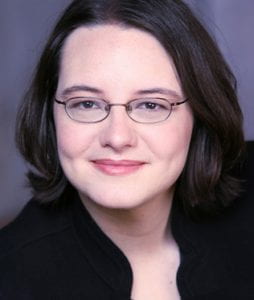Keynote Speaker: Warren Spector
Warren Spector has been making games for 30 years. His studio, Junction Point, was acquired in 2007 by The Walt Disney Company. The recipient of lifetime achievement awards from the Game Developers Conference and Cartoons on the Bay, his work has been featured at the Australian Center for the Moving Image and the Smithsonian Institution. Spector received a BS in Speech from Northwestern, an MA in RTF from The University of Texas at Austin and an honorary Doctorate from Columbia College of Chicago.

Susan Bonds
Susan Bonds is a pioneer in experiential storytelling—the art of crafting immersive narratives that spill off the screen and allow the audience to participate across platforms – and the force behind 42 Entertainment’s critically acclaimed interactive experiences. As co-founder and CEO of 42 Entertainment, Susan has led the evolution, from alternate reality games to deeply immersive entertainment experiences that engage millions of people worldwide. She has focused 42 to take advantage of what she calls “true convergence”—the social, technological, gaming and story alignment that enables 42 to give the audience a role in The Dark Knight, Halo, or The Girl with the Dragon Tattoo. These rich worlds extend beyond film screens, game consoles, television shows, book pages, brands, products and music, allowing audiences to “live” the story in unforgettable ways that intersect when, where, and how they program their life.

Kevin Bruner
Kevin co-founded Telltale, Inc in 2004 to blend technology, creativity and production processes to create a new entertainment experience and define a new business model. Since its inception, Telltale has pioneered episodic gaming, becoming the first company to release games as monthly episodes. Since 1990, Kevin has been creating entertainment technology for video games, television game shows, museum installations and more. Prior to founding Telltale, Kevin applied his talents at LucasArts, working on cutting edge projects such as the classic Grim Fandango noir adventure and epic Star Wars titles, as well as crafting core company technology strategies.

Stéphane Bura
A role-playing game writer of 25 years, Stéphane has advanced degrees in artificial intelligence specializing in the study of emerging properties in complex worlds. Before joining Storybricks as their lead designer, he worked with Kalisto Entertainment, 10tacle Belgium, and as an independent game design consultant. His work on game design theory can be found at www.stephanebura.com
Clint Hocking
Clint is a designer working at Valve. Prior to that, he worked for a short time as a Creative Director at LucasArts in San Francisco, and for nine years at Ubisoft in Montreal where he was a level designer, game designer, scriptwriter and creative director on the original SPLINTER CELL, on SPLINTER CELL: CHAOS THEORY, and on FAR CRY 2. Before games Clint worked in the web industry and experimented with independent filmmaking while earning an M.F.A in creative writing from the University of British Columbia. He maintains a blog at www.clicknothing.com. He lives in Seattle with his family.
Asa Kalama
Asa Kalama is a Creative Director for Walt Disney Imagineering, Research & Development. In this role, Kalama is responsible for creative applications of emergent technologies and the development of new experience paradigms. As advocate for Walt Disney Imagineering, Research & Development’s Narrative Experience Portfolio, his primary area of focus is interactive experience design with specific concentrations in Interactive Story-Telling and Role-Play.
Matt MacLaurin
Matt is the senior director of eBay’s EPIC Design Lab. He is a 25-year veteran of Apple, Microsoft Game Studios, Cyan, and the primary inventor of Kodu, Microsoft’s game design system for children. He’s always on the lookout for new ways to connect the worlds of art and technology.
Michael Mateas
Michael Mateas is Director of the Center for Games and Playable Media. He is an Associate Professor of Computer Science at University of California, Santa Cruz, where he helped launch the Computer Game Design degree, the first of its kind in the UC system. His work explores artificial intelligence-based art and entertainment, forging a new research discipline called Expressive AI.
Brenda Romero
Romero entered the video game industry in 1981 at the age of 15 and has been highly influential as a game designer, artist, writer, and creative director. She has worked with a variety of digital game companies, including Atari, Sir-tech Software, Electronic Arts, Firaxis, and numerous companies in the social media space. She is also the creator of an award-winning, ongoing series of non-digital games titled The Mechanic is the Message.

Richard Rouse
Richard Rouse III is a creative director, game designer and writer who has been working professionally for 19 years and is currently at Microsoft Game Studios working on unannounced projects. His titles include The Suffering, The Suffering: Ties That Bind, Wheelman, Homefront, Drakan: The Ancients’ Gates, Centipede 3D, Damage Incorporated and Odyssey: The Legend of Nemesis, and he has consulted on numerous other titles. Previously he worked at Ubisoft Montreal, THQ, Midway and Surreal Software. Known for his writing and lectures about game design and interactive storytelling, Rouse wrote the popular book Game Design: Theory & Practice and is a frequent speaker at conferences and universities around the world. You can see more of his work at www.paranoidproductions.com

Tawny Schlieski
Tawny Schlieski is a Research Scientist and media expert in Intel Lab’s Interaction & Experience Research group.Tawny brings to bear many years of research and experience on the impact of technology on media and storytelling. Her work includes the challenges and opportunities of 3D and other new forms of capture and playback, computational photography, fan fiction, and multi-media story platforms. Her job is to merge social science and market insights, technology evolutions, and imagination into pragmatic visions and compelling experiences for consumers and computing. Her current work is focused on the possibilities for new forms of genuinely interactive narrative that can be enabled by rapidly evolving technical capabilities. Tawny has a master’s degree in political science from Duke University, and has studied and worked in the theater throughout her career.
Emily Short







